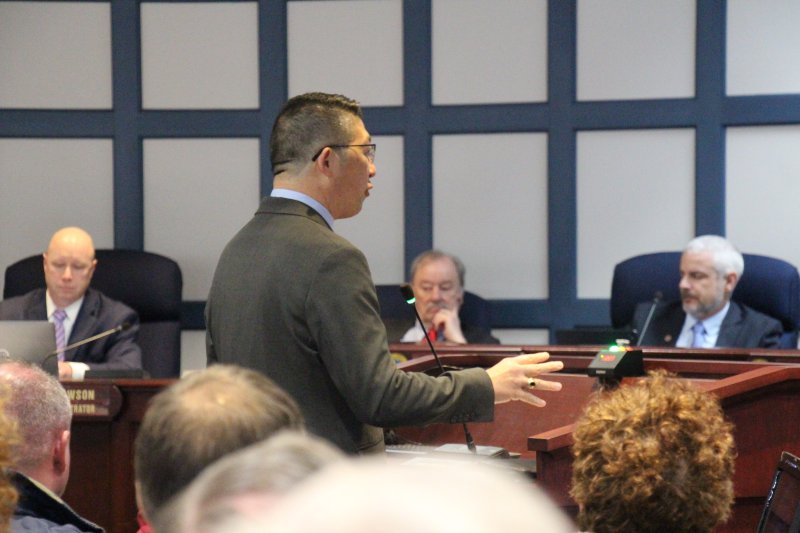Beebe Healthcare presses for change in county, state, nation
Editor’s note: This is the second part of a three-part series about Beebe Healthcare and the growing demand for healthcare services in Sussex County.
As the fastest-growing county in Delaware, Sussex County is having a boom in not only population, but also political clout that accompanies it.
As the largest healthcare provider in the county, Beebe Healthcare has begun flexing its growing muscles to influence that growth and healthcare in the county and beyond, said Beebe President and CEO Dr. David Tam.
He points to the county’s 10% growth rate from 2020 to 2023, which shows no sign of slowing in the next five years. Much of that growth is people aged 65 and older, who have increased need for medical services.
“As part of our strategic plan, Beebe Healthcare has recognized that we have not done a good job of being in the forefront of healthcare in Delaware,” Tam said. “We’ve let – to some extent, for all kinds of reasons – the larger health systems be the ones to dictate healthcare trends in Delaware.”
Tam serves on the Council of Regents, the legislative body of the American College of Healthcare Executives. He is also a member of the board of directors for the Delaware Healthcare Association and the Delaware State Chamber of Commerce.
A priority of Beebe Healthcare is influencing development in Sussex County and healthcare issues at the state and federal levels, Tam said. He has been lobbying against cuts in Medicare and Medicaid in recent months.
“I’ve been in D.C. a couple of times in the last month, month-and-a-half,” he said. “I’ve been talking with people across the country – the American Hospital Association, the American Health Care Association – about the fact that there will be significant effects on Medicaid and Medicare. That’s going to have a huge impact on the people of Delaware and the people of Sussex County.”
A nationwide shortage of physicians has hit Delaware particularly hard. Figures released in January show Delaware stands last among states nationwide for access to primary-care physicians, meeting the needs of only 14.85% of its residents.
“The longer they live, the more healthcare they’ll need,” Tam said. “It is clear that we have to figure out how to increase the number of physicians and providers that live and work in Sussex County.”
In the 2024 fiscal year, Beebe hired 667 people, including 45 physicians and advanced practice clinicians, and more than 150 nurses, Tam said.
Tam and his leadership team have become regulars at meetings of Sussex County Council and the county planning & zoning commission. They opposed a proposed one-year moratorium on large housing developments and continue to urge approval of housing developments that include affordable or workforce housing.
Affordable housing built close to where people work is needed to support Beebe’s growth, including toward the west side of the county, Tam said. A commute of over an hour to work during the summer tourism season makes life difficult for hospital employees, he said.
While he backs housing development, Tam said that growth must be managed to maintain a quality of life for existing and potential residents.
”We are opposed to rampant growth,” he said. “We do not see the need. We want to make sure that growth is monitored. Most people don’t come here and say, ‘How much does a house cost?’ They ask Realtors, ‘Am I going to be able to see a doctor?’”
Tam said he has pressed for state policy changes and more healthcare spending, and urged creation of a medical school based in Sussex County.
The county is the largest contributor in realty transfer tax revenues to the State of Delaware, which should give it leverage to make its voice heard on urgent care and other healthcare issues.
“Sussex County is the fastest-growing county in the state,” Tam said. “Sussex County actually has, as a result of all the growth, the highest level of real estate transfer tax percentage in terms of a state revenue source than any other county. We need to be at a place where we’re sitting there at the table in Dover as well as with the federal delegation to talk about the importance of urgent care.”
Kevin Conlon came to the Cape Gazette with nearly 40 years of newspaper experience since graduating from St. Bonaventure University in New York with a bachelor's degree in mass communication. He reports on Sussex County government and other assignments as needed.
His career spans working as a reporter and editor at daily newspapers in upstate New York, including The Daily Gazette in Schenectady. He comes to the Cape Gazette from the Cortland Standard, where he was an editor for more than 25 years, and in recent years also contributed as a columnist and opinion page writer. He and his staff won regional and state writing awards.
Conlon was relocating to Lewes when he came across an advertisement for a reporter job at the Cape Gazette, and the decision to pursue it paid off. His new position gives him an opportunity to stay in a career that he loves, covering local news for an independently owned newspaper.
Conlon is the father of seven children and grandfather to two young boys. In his spare time, he trains for and competes in triathlons and other races. Now settling into the Cape Region, he is searching out hilly trails and roads with wide shoulders. He is a fan of St. Bonaventure sports, especially rugby and basketball, as well as following the Mets, Steelers and Celtics.


















































